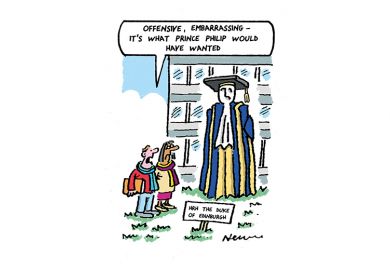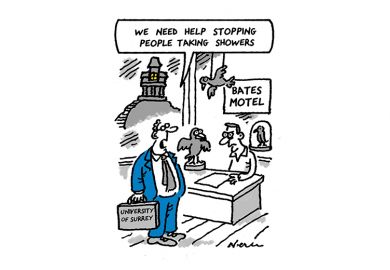
When university freshers first arrive on UK campuses, they’ll probably receive some health advice about alcohol, with the charity Drinkaware, which distributes free cups to measure units, among those to offer educational initiatives. But Drinkaware, like many other schemes, is funded by “major alcohol producers and retailers, venues and restaurant groups”, The BMJ reported. Now, public health experts are calling for the UK to stamp out alcohol industry-funded educational programmes – following Ireland’s lead, which recently banned such schemes from schools. The initiatives have faced criticism for normalising drinking as well as a lack of rigorous evaluation. Katherine Severi, chief executive of the Institute of Alcohol Studies, told The BMJ that industry-funded programmes were “protecting industry profits”, adding, “They are delaying the implementation of evidence-based policies because they are providing a distraction.” Could booze-oriented “freshers’ week survival guides”, like those provided by Drinkaware, be on their way out?
When neuroscientists train mice to perform tasks, they do so in the hope of unlocking new academic insights: into memory, for instance, or other inner workings of the brain. But it turns out the researchers aren’t the only ones learning from the process, as The Times reported: two researchers from Johns Hopkins University recently concluded that their mice were conducting experiments of their own. When Kishore Kuchibhotla and Ziyi Zhu of Johns Hopkins noticed their mice were making frequent, inexplicable “mistakes” during experiments, they developed two hypotheses: either the rodents were getting stressed, or they were deliberately diverging from expected behaviours in order to learn more about their environment. The latter, their study indicated, was the case. “Mice are more strategic than some might believe,” Dr Kuchibhotla said. “It may look like the animal is making a ton of errors, but during those errors it’s actually getting smarter.”
Bad news for arachnophobes: exotic spiders are “flourishing” in Britain, according to The Guardian, with a new species of jumping spider recently identified on the Cornwall campus of the University of Exeter and Falmouth University. Tylan Berry of the British Arachnological Society spotted the 3mm-4mm spider while taking part in a “bioblitz” (or, in less exciting terminology, a biological census), telling the newspaper: “It’s a pretty little thing, and looks like a bit of old 1970s carpet – brown and white and patterned.” The newly identified spider, whose closest known relative is found in the Caribbean, is “established on the campus and easy to find in good numbers, living and breeding, and it’s also been found in another ornamental garden 30 miles away”, Mr Berry said. And the good news keeps coming for the spider-averse: “much larger” Mediterranean species now very much at home in the UK include the false wolf spider and the green-fanged tube web spider, names that don’t sound frightening in the slightest.
The student who makes it through university without a single embarrassing moment immortalised on camera is a rare (and lucky) one. But a recent series of photos captured at the University of Cambridge went too far, those involved told student newspaper Varsity. As The Times reported, Fitzwilliam College distributed photos of students’ messy bedrooms and kitchens, taken by housekeepers without their knowledge, in a college-wide email that described them as “an illustration of what housekeeping DO NOT want to see on their weekly visits”. The college subsequently recalled the email and apologised to students, telling The Times, “The inclusion of an image of a student room was unacceptable.” For some, however, the damage was done: “Everyone knew it was my kitchen, so I was near enough named and shamed to the entire college,” one student said, calling the “deeply embarrassing” incident a “massive invasion of privacy”.
Literature researchers might want to double-check that first-edition novel before they cite it: nine people have been arrested on suspicion of stealing valuable Russian-language books from the 19th century and replacing them with “outstanding quality” fakes, The Guardian reported. According to Europol, the group is believed to have stolen at least 170 books from libraries across Europe, many of which were subsequently sold at auction and are now considered “irrecoverable”. Among the institutions struck were the University of Warsaw, which reported the loss of Pushkin and Gogol first editions, and the National Institute for Oriental Languages and Civilisations, Paris, from which a dozen manuscripts were stolen. “In total, the criminal group is believed to be responsible for the theft of at least 170 books, causing financial damages amounting to around €2.5 million (£2.1 million) and an immeasurable patrimonial loss to society,” Europol said in a statement.
Register to continue
Why register?
- Registration is free and only takes a moment
- Once registered, you can read 3 articles a month
- Sign up for our newsletter
Subscribe
Or subscribe for unlimited access to:
- Unlimited access to news, views, insights & reviews
- Digital editions
- Digital access to THE’s university and college rankings analysis
Already registered or a current subscriber?



